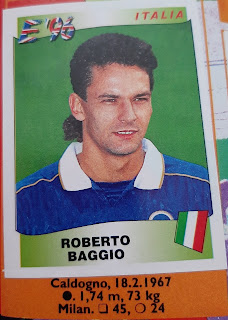61: Neil Shipperley, Crystal Palace, Merlin’s Premier League Kick Off Sticker Collection, 1997
In the world of work the phrase “never go back” is often bandied about. After all, if you left a job (or got asked to leave a job), why would you want to return to your former employers? In football returning to a former club can be portrayed by some as an admittance of failure or a lack of ambition but the game is full of players who have made such moves for a range of reasons. For some, like Kevin Davies, it was due to a struggle to hit the expected heights but there are plenty of others who returned to an old flame to reignite a career or, like Brian Deane, finish their careers where they first hit the headlines. And then there’s Neil Shipperley.
Neil Shipperley first arrived at Selhurst Park following a spell at Southampton where his first-team opportunities were limited by the arrival of Egil Ostenstad and the continuing excellence of Matt Le Tissier. Oh, and Graeme Souness signing ‘George Weah’s cousin’ Ali Dia (rather than George Weah’s actual cousin Christopher Wreh) due to a shortage of strikers. Prior to this Shipperley had come through the ranks at Chelsea, making his debut in the inaugural Premier League season and scoring on his first start against Wimbledon. In 1994 an article in The Independent pipped Shipperly to become Chelsea’s first homegrown star striker since Peter Osgood and, while this clearly didn’t happen, Crystal Palace had pulled off something of a coup in signing a proven Premier League forward for a neat £1m in October 1996.
Shipperley was an instant success for the Eagles and contributed 13 goals in their promotion-winning season including a goal in their play-off semi-final win over Wolverhampton Wanderers. While Palace would go on to sign a host of forwards such as Ivano Bonetti, Michele Padovano and Tomas Brolin in their ultimately miserable 1997/98 campaign in the top flight, Shipperley provided some positivity with seven goals in 28 games including five in five during a purple patch between October and December. Somewhat understandably he moved back to the Premier League with newly promoted Nottingham Forest and that was presumed to be that. 21 goals in 61 appearances and a tidy £500,000 profit was good business for the yo-yoing Palace side I fell in love with.
Over the next five years Palace tried, and failed, to get promoted out of Division 1 and, if we’re being realistic, came much closer to exiting the league through the trap door after entering administration and generally being a bit crap. Shipperley managed only one goal in his 20 league appearances with Forest and had returned to the second tier with Barnsley and Wimbledon where he accumulated around 60 goals across 165 games. In July 2003 the striker returned to Crystal Palace.
Shipperley scored the winner against Watford in his first game back at Selhurst Park but, despite winning their first three matches, Palace had slipped into the relegation zone by December. Under Iain Dowie the Eagles shot up the Division 1 table thanks in large to the classic big lad/small lad combination of Shipperley and Andy Johnson leading them to the play-offs and the footballing world to believe that Iain Dowie was an excellent manager and that “bouncebackability” was an acceptable phrase.
Shipperley scored for Palace in their thrilling 3-2 semi-final first leg win over Sunderland and held his nerve to score in the penalty shootout that settled the second leg. He was handed the captain’s armband for the final against West Ham United and, just after the hour mark, the ball fell to the big striker to bundle in the winning goal from approximately half a yard out. It was a pretty awful game and the Hammers had two goals ruled out for the kind of offsides that VAR wouldn’t need to draw random lines from people’s armpits for but Palace were back in the Premier League thanks to the goals of Neil Shipperley. History truly does repeat itself.
Despite its success in their promotion, Dowie quickly abandoned the Shipperley/Johnson partnership but continued to rely on lumping long balls forward to the diminutive striker while Shipperley was limited to three substitute appearances in all competitions. In fairness to Johnson he scored 21 goals but somewhat unsurprisingly with these tactics Palace were relegated. Shipperley moved on to Sheffield United and scored 11 times to help the Blades gain promotion to the Premier League but failed to make a single appearance in the top flight and moved on to Brentford where he retired at the end of the 2006/07 season.
Neil Shipperley kept a fairly low profile following retirement as he looked to gain management experience with non-league sides Bedfont, Walton Casuals and North Greenford United. Sadly he was in the headlines in 2019 following a conviction for indecent exposure which his defence described as “a cry for help” following the former striker’s gambling problems, debts and struggles to cope with the death of his father. I can only hope that the counselling he has received helps him to deal with his issues and, who knows, maybe he can get his life back on track. Time will tell if that involves another return to Selhurst Park.





Comments
Post a Comment